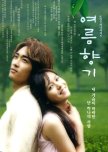
It´s comparably less makjang, but more morals – and Schubert's Serenade, again and again
"Summer Scent" is one of those early classical KDramas, marking the emergence of the South Korean TVdrama genre as an export hit with all its quality features. In the early 2000s the Hallyu, the Korean Wave started creating a stir, first in Asia and at last throughout the rest of the world.Typically, the narration is so richly peppered with sometimes malicious, sometimes tragic twists - ´makjang´ at its best - that for some the emotionalism might be almost unbearable, if you are not ready open up for the deepest dramas of heart and soul. KDrama is in that context also a master of nasty, often enough quite malicious twists and turns. However, "Summer Scent" is comparably less makjang, but more morals. Nevertheless, with their decisions the protagonists truely can put a strain on your nerves. You should to be prepared to sympathy, suffering and compassion - even if you might struggle at times. This KDrama, too, with its twists and turns rocks the boat until the very end...
The plot juggles a heart transplant with the idea of cell memory. The whole story is poetically told, memorably filmed in front of a summery backdrop and played with a lot of heart. On top of that, the soundtrack eats its way mercilessly into the hearts of the audience: Schubert's Serenade, sometimes in German, sometimes in Korean, sometimes instrumental, but: the serenade again and again...
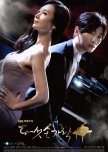
A must-have for makjang-lovers. A roller coaster of evil where you end up feeling for the worst, too
"Five Fingers" is a must-have for all those who love "makjang". A roller coaster of evil... and it doesn't stop. The spectators are allowed to tear their hair, wriggle, turn, annoy themselves to the bitter end... It's about the piano, too - some battles take place while playing, being around and doing business with the grand piano.This is about family and South Korean family values/virtues in particular. Submission to the value system is declined as a virtue in all its fatality. In the interweaving of events, the viewer inevitably faces the question again and again: is it virtue or stupidity, virtue or impertinence, virtue or arrogance?
The series dates from 2012 and makes a cunning attempt to challenge viewers to confront the value system. The rebellious thoughts inevitably arise in the minds of the viewers, because the well-meaning decisions that the protagonists make over and over again drive the values surrounding family (love) to the absurd and trigger suffering one after the other.
The ambivalence inherent in this is exploited perfectly. The actors do their part.
With 30 episodes there may be a tendency to flee in between, but I don't know anyone who didn't stick it out to the end. The ending may not be the classic happy ending, but it may be the true happy ending: the wheel of fortune comes to a standstill. Peace.
At first glance, the greed for money and power seems to be the driving force behind all evil. But actually it is the greed for love and recognition. The wheel of fate and suffering has already been turned on long before the protagonists - the two half-brothers In-ha and Jin-ho - compete against each other. To a certain extent they live out the unresolved conflicts of their parents. If you want to ask who is to blame for everything, then the root goes back a long way. The father pulls the strings out of the grave and it goes even further. A nice psychological study. Especially since you can't help but feel sympathy for everyone, even the worst troublemakers.
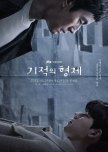
Powerful plot. Solid & unique. Four-dimensional. An enrichment on the KDrama crime thriller market
A solid thriller, laid out across time and space. The fourth dimension has a hand in the investigation. There's a bit of magic involved too.You can expect an suspenseful, opaque story with edgy characters - in particular a cheeky, blustering, stroppy anti-hero as male protagonist. As a writer he is ambitious but probably rather untalented. However, he is also someone who doesn't easily give in and doesn't like to be fooled. And there is this delicate, gifted, mysterious stranger crossing his path…
The criminal act and the perpetrator as such may seem rather familiar, sort of. But pretty much everything knitted around this crime is off the beaten track! With strong characters and powerful plot. An enrichment on the KDrama crime thriller market! With time and space becoming relative...
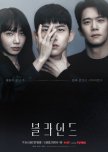
Exciting, yet gloomy thriller. The murder case being tried by a jury is just a kick off for more…
"Blind" is a fabulous, exciting, somewhat dark thriller."Blind" weaves its fictional story around 'survivors' of brutal child abuse and severely traumatizing exploitation as kids. These 'survivors' meet each other and their perpetrators 20 years later as adults. Each of those involved tried in his/her own way to come to terms with the past and lead a more or less normal life. Not only the abusive childhood, but also its psychological effects on their later life are a severe issue - and become a topic here. In addition, in this context complex interdependencies between the perpetrators of the time are dissolved and - against the background of a brutal variant of public vigilante justice - the original roles as perpetrators and victims are turned upside down.
"Blind" is haunting. The focus is on a murder case that is being tried by a jury. More murders follow. The dramaturgical setting is to some extent perhaps a bit reminiscent of an Agatha Christie novel - insofar as suddenly almost everyone in the case-related group of the selected jury could be the perpetrators... the distribution of roles between judges, investigators, victims and presumed suspects is also becoming increasingly opaque and fatefully intertwined. To pretend that one can turn a 'blind' eye to what used to be is no longer possible. Everyone must now look at the past and (even if it is perhaps a little late) bear the consequences. Magnificent.
----- SIDE NOTE: ---Child abuse - a sad and highly topical issue in South Korea ---
The thriller obviously saddles its story on the unspeakably sad topic of child abuse, which due to its unbroken topicality has increasingly made it into South Korea's series and film productions of recent years (among others "Children of Nobody" and "Mother" as drama or "Miss Baek" and "Bring me Home" as movie.) Many a well-established member of society prefer to look the other way when unbelievable deals are being made concerning minors, as long as they might even benefit themselves. And any 'survivors' can be glad if they manage to split off the traumatic experience to some extent - nevertheless most often PTS comes right along. Usually, those ´survivors´ until old age are psychologically still stuck in that desperate helplessness and inner agony of the past.
A South Korean government study from 2021 reveals, that abusive trafficking in minors has been rampant and even increasing in recent years. There is an acute need for action regarding more effective education in all public areas - from prevention to investigation and criminal prosecution up to employee training. A big problem with this: usually police officers or other officials are directly involved and work together with the traffickers, who specialize in the ruthless exploitation of minors. If the children and young people survive this, the psychological consequences of these deeply traumatizing experiences will be very hard - if at all - to be overcome. They are left helpless at the mercy of adults (who actually should take good care of them) and utterly hopeless in the face of a society that turns a blind eye to their torment. The only thing that is left: feeling betrayed and/or obviously of no worth whatsoever...
--------------------------
PS:
It may be that in reality a larger task force would have been set up to investigate the serial murders of the jury members. In my opinion, however, the KDrama didn't take anything away from keeping the circle compact in order to tell the story in its essential entanglements in a powerful way.
P.P.S.:
At last, I don't want to leave a pleasant detail (I think) unmentioned. We have seen it so often in KDramas: within the social ranking in South Korea, the older colleagues are obviously allowed to rebuke the younger ones with a shove, a kick or a snap on the forehead. (In view of my German socialization background, that is unheard of, but ...) In "Blind" one can now observe (among other things) that a transformation in this natural ranking behavior may be starting to happen within the younger generation: a colleague police officer in "Blind" actually gives back to his colleague and stands up for himself. So far, I have seen this rather rarely, if at all. Until now, as a rule in comparable situations, the fist usually remained in the pocket. In the mass consciousness, KDrama is relating to, starting 2022 such physical rebuke might obviously no longer be tolerated as a matter of course. Stand-up-for-your-rights seems to/wants to become possible - like a wind breeze of change coming up within a hierarchical tradition since centuries chiseled in stone...
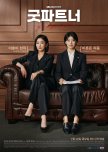
About "good" partners in various senses. A pleasantly vivid and complex, well-rounded story.
“Good Partner” is about lawyer and divorce cases, while radiating quite some ´work life in Seoul´ feeling. The main focus obviously is on divorce and everything that comes with it. In South Korea so far, divorce has been an issue ´non grata´ sort of. But it has become quite hot recently. Being able to deliberately elaborating this topic in a KDrama is due to exploding divorce rates. Even the older generation is increasingly daring to take measures by leaving the unhappy marriage behind and finally daring to make a new start. Of course, separation is never easy and becomes even more complicated as children are involved. “Good Partner” tackles the hot topic fearlessly. Additionally, some still questionable legal issues surrounding divorce are mercilessly brought to light, as are the notorious cheaters and the tragic, far too frequent cases of misogynistic, domestic violence.“Good Partner” also deals with the rigid chains of command, often enough turning lawyers in large law firms into mere underlings. On the other hand, the KDrama also confronts the question of the right dose of sense of morality, distance or even abstinence one should/must/may/want to emotionally attach to the cases. Furthermore, "Good Partner" also confronts the closed-meshed career culture in everyday office life, where employees can quickly lose themselves while living up to expectations. Work-Life-Balance ist still a fairly new concept. And last but not least, a critical swipe at the unfairly privileged “elite” (= “we have special status and are allowed to do everything”) should not be missing, too.
Embedded in the office world of the two protagonists, quite a lot of contemporary burning issues that currently concern and shape the lives of many people i.e. in South Korea, especially in Seoul, are carefully considered and illuminated from different sides. In doing so, the KDrama is opening up new space for contemporary approaches towards dealing with well-known life issues. A pleasantly vivid and complex, well-rounded story.
“Good Partner” feels like it gets better with each episode. This is also due to the development of the protagonists as they sincerely face their personal concepts and convictions again and again in the context of their cases (not least thanks to Han Yu Ri's untiring sense of morality)... Thus, in the long run, the KDrama is about "good" partners in various senses, not only when it comes to the female leads. However, together those two are creating a pleasant breeze of sisterhood, one that feels particularly good in the midst of a predominantly patriarchal world.
All of this makes “Good Partner” a deserved success. TV audience in the country more than doubled over the course of the 16 episodes. Understandably so. I can definitely recommend this series.
PS:
PLEASE do yourself a favor and give episode “0” a wide berth!!
It's a complete aberration and has nothing to do with the actual KDrama, except that someone apparently got bored during the temporary broadcast break during the 2024 Summer Olympics... You can definitely ignore that one, believe me.
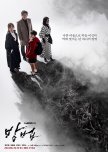
Thrilling. Unsettling to some extent. Additionally to an enthralling story you get great acting.
"The Cursed" puts Korean shamanism at the center of events. Shamans play their role again and again in KDramas - even if they are only indirectly present in the form of yellow adhesive talismans in red Hanja writing for fertility, luck, prosperity, etc. But in "The Cursed" they actively determine what happens. The shamans are distinguished by their spirit conection and/or have inherited their practice. To this day, Muism or Sindo - the shaman religion - is firmly rooted in everyday life as the oldest popular belief system.So you inevitably have to deal with magical rituals, shamanistic practices and (in this case) evil spirits who quickly possess people or e.g.. rather curse them. It is quite somber and frightening considering that mere human ability has little to counter these forces and practices.
Viewer ratings have more than doubled over the course of the TVseries. For South Korean audiences, the KDrama obviously struck a chord. For me it was an intense drama. Thrilling. Unsettling to some extent. Generally, I would recommend it, if you are open to face another realm besides our rational reality. Additionally to an enthralling story you get great acting. (No romance, though...)
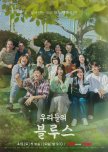
Outstanding! A KDrama that somehow satisfyingly feeds the human heart.
The KDrama "Our Blues" unfolds a distinctive magic that gently stretches its silken net around the hearts of the viewers and thus spreads warmth. Big KDrama!Re. musical genre: the blues is a kind of lament, sad in nature and born of pain. In "Our Blues" it's not the lamentations of slaves on the plantations, but those of several very average people living where South Koreans prefer to go for vacation: Jeju Island. The protagonists´ lifes are in no way spectacular. They are rather normal for their age and the place. They work hard for their income, live simply and often on what the land (and in this case the sea) offers them. From the buzz of these individual and yet so normal lamentations, a sense of unity grows, that even transcends the screen - because many can sympathize with it and identify with their painful and often humiliating experiences in their own way. That makes it "OUR" blues in several ways. It reaches out from the world of the KDrama into the world of the audience and brings us as people from all over the world a bit closer to each other.
"Our Blues" fondly tells a dozen stories about disappointments and unhealed mental wounds that many people know in one way or another and may have experienced themselves. Most of the protagonists (all wonderful first-class cast!) have known each other more or less since childhood. They form a community of colleagues, friends, family and family of choice. Although Jeju-do is South Korea's largest island, it is relatively small at 73 km x 31 km. At its center, South Korea's highest mountain - the dormant Hallasan Volcano - divides the island into the northern area around the city of Jeju and the southern area around the city of Seogwipo. Seogwipo has an urban center with the harbor and then there is urban sprawl with village structures along the coast. This city characterizes the living environment of the characters. As audience, we accompany some of them in a kind of latent mental process of molting.
Some say there is no such thing as a storyline in "Our Blues". In fact, it is more of a composition, or rather a kaleidoscope of independent lamentations. At the core of each lies an ancient pain. What's magnificent about "Our Blues" is that (and how) these songs are finally being sung and thus make space for light and love. For far too long, the protagonists have kept their pain deeply hidden within. They tried to live with it neatly packed away, instead of 'giving' it some space. Yet, sooner or later, the old pain just 'takes' its space... for 20 episodes...
I would´t call it healing, rather transformation, because the painful experience of the past is and remains what it was. However, the potential of what is possible in the future is changing. When the pain in the heart is finally allowed to find space and show itself, it can be witnessed and receive the recognition it deserves. The spasm dissolves and energy is released. Thus new experiences are now possible in the future.
Wanting to spare oneself or others, or wanting to avoid conflict and confrontation, has ultimately never really worked or done any good. Actually, emotional pain and psychological suffering have something to offer: they are the key to opening a portal to a new dimension of truthfulness. The recipe is quite simple: friction (in a deliberately tangible sense of rubbing) facilitates closeness. The problem that prevents this potential for closeness is very human: fear. Because the prerequisite is that I have to honestly show myself as I am (e.g. with my feelings). In doing so, I make myself vulnerable. But only then someone dear to me can reach out and touch me for real. And only in this way true encounter between me and the world becomes possible. Self-assured. Aware of myself. Straightforward. Straight. Upright.
In this KDrama lamentations are ´sung´ and ´heard´. Deep down they are sad, true enough. Yet, it makes you happy, that they are sung at last. And it is just beautiful the way those stories are told: The variety of stories about friendship dynamics, unrequited love and sensitive family relationships are affectionately interwoven in many layers and gain in radiance. We repeatedly encounter individual protagonists in several contexts. One person after the other ... we can´t help to grow fond of them. Ultimately, besides the very human blues that life inevitably offers as a portal to become who we are, the constants in all time, here, there and everywhere, are the sea around us and the sky above. Jeju-do as location for this KDama just hits the spot!
A KDrama that somehow satisfyingly feeds the human heart.
(By the way: "Our Blues" has become one of the highest-rated series on South Korean cable television. Viewer ratings have doubled from episode 1 to 20. (As I said, you grow fond of it over time...)
----------------- SIDE NOTE: --- Haenyeo = sea women or daughters of the sea ---
Jeju-do is famous not only as a tourist hotspot with boardwalks and hotels for honeymooners (Jeju International Airport is the third largest in the country), but also for its volcanic landscape, which is now a World Heritage Site. Yet, furthermore, characteristic of the island's tradition are the Haenyeos, who have been diving for centuries without oxygen tanks for abalone (or sea snails) and other sea food. Especially abalone is plentiful on the seabed around the island. However, these are not so easy to harvest by conventional fishing industry.
To this day, the archaic way of free diving is the only proven one: hold your breath, dive down with a hook, a weight belt and a small net, and then skilfully scrape the seafood off the rocks at the bottom. Today, wetsuits, diving goggles and fins help. A buoy marks the 'area'. Not everyone can do that. Apparently women are particularly good at it. Often families practice this craft for many generations already. The technique of holding your breath for around 3 minutes at high underwater pressure, even at a water temperature of 8 °C, is usually passed on to the daughter. (Actually, in these circles the birth of a daughter is finally empathically praised and extensively celebrated.)
The income of the sought-after Haenyeo has become quite respectable. They are economically independent by now. These days, however, there is shadow to it, too. Being able to finance university studies for their offspring, the young generation nowadays prefers to move to the mainland for higher education and more comfortable jobs. Accordingly, the Haenyeos could soon become extinct. Nevertheless, once you are a Haenyeo, you stay with the diving until old age.
----------------------------------------------------------------------------------------------------
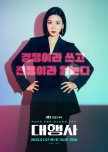
Women on the ball. Delighting, enraging, inspiring, concerning. Excellent script. High-end KDrama.
"Agency" has it all. Viewership has skyrocketed, as have ratings. "Agency" is the hit. Cool freshness, fashion, speed, one or the other rivalry as well as all categories of human manners, even the lowest, underline the handpicked lifestyle ambience. This all guarantees a lot of fun, seriously...The topic hits the South Korean nerve of the time. The nerve of women in particular, I should add. What may appear to Western eyes as an entertaining office drama with catfights has a completely different explosiveness in the eyes of Asian, especially South Korean viewers: The deeply hidden, rousing topic of the time, which affects everyone, is ´population decline´. The critical nerve bubbling on the surface revolves around ´sexism´ and ´misogyny´. The incumbent President Yoon proclaimed that these topics could be shut into history books, but "Agency" gives him the lie, right on. The KDrama clearly demonstrates how up-to-date it is. More than one South Korean woman in this story, no matter what position – down to the generation of the mothers of those mothers in the series - will find themselves here. And more than one man as well...
It is pleasing to see how razor-sharp and competent the female protagonist proves herself in this man's world. Also pleasantly refreshing side effect here and there: alternative model approaches for female vs. male management styles. And then there is the extravagantly privileged and insolent Jaebeol of the youngest generation who eventually is inspired to break free from her heavy chains of family-clan expectations. Besides their punching power, both lead ladies are palpable, too. Watching the series is a pleasure, even if the topics touched on may also arouse rather different feelings as well... A colorful bouquet of thematically critical, plot-relevant threads is dramaturgically subtly intertwined. In addition to the two female leads, there are also diverting (women´s lib) moving stories about Go Ah-in's employees and colleagues.
Stellar, good-humoured actors. Excellent script. A wonderfully balanced mixture of fun and seriousness, of pace and depth. The coherent details were undeterred on a differentiated, complex overall picture of the current business world. High-end KDrama-'pleasure' – delighting, enraging, inspiring and concerning. And while we are at it, "Agency" is innocently, smilingly, prettily and yet cleverly and valiantly placing a feminism-sting, too.
---------------------------------------------
SIDE NOTE: --- Misogyny and population decline in South Korean society ---
Without women it won´t do. But South Korean President Yoon has now officially messed with them. There was an enormous wave of protests when he announced that he wanted to abolish the ministry, which had been set up around 20 years ago to support women against sexual assaults and for equal rights, arguing the issue was no longer an issue. Immediately, around 800 organizations formed and stood up. President Yoon, who is promoted and sponsored by a strong conservative, patriarchal current, has blown a hornet's nest. His world – that of macho men – is obviously different from that of contemporary South Korean women.
It is a given fact, that misogyny in South Korea characterizes everyday life throughout all classes. Neither an entrenched, male-dominated business world from the bottom up to the boardrooms, nor professional disadvantage and discrimination of women in the workplace, belong to history yet. In the contrary, recently it has even been fuelled by the election of the current President Yoon. Fortunately, there are opposing movements and criticism. The KDrama "Agency" uses a socially critical magnifying glass here. Nevertheless, there is still a long way to go, although a drastic reflection is desperately needed, in order to be redirect economic development towards a positive light.
The current demographic trend is closely linked to the economic and social situation, which is shaped by antiquated patriarchal beliefs. Those old (apparently always happy to be taken off the socio-cultural shelf, dusted off, polished to a high gloss and then put back again) convictions stand in stark contradiction to the high pace of the high-tech modernity of everyday life in South Korea. This tense paradox is already having a negative impact (not just on women's attitudes towards life, but also) on the country´s economy. The official statistics on population development from August 2022 show declining numbers for the first time. Actually, the country's birth rate is the lowest in the world. There is no trend reversal in sight. The population will continue to shrink. And that is already and will even more so affect the economy. The proportion of women in the working population (at 55.1 percent) could certainly be increased. Although South Korean women are very well educated on average, only a little more than half of them actually bring their skills into business life. Among men, on the other hand, 73.7 percent are employed. This is due not least to the misogynist attitude in all areas. The difference in pay between women and men is estimated at 31.1 percent. Nowhere else in the 38 OECD countries is it THAT bad. Added to this is the disadvantage on the career path. Work-life balance is in its infancy, because the motto is: woman to the stove. Executive suites are for men only. Women are rarely seen here. And if so, then often only for ornament or to fill the image of an empty marketing shell (similar to "Agency").
It's high time that the many misogynists among South Korean men (including their president) arrived in the present. In the long run, a trend reversal can only succeed jointly – at eye level.
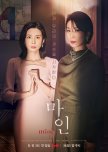
Within a male dominated spectacularly exclusive golden Jaebeol-Cage women stand up for their rights
The (fictional) Hyowon Group's extended family is among the richest one percent in the country. This clan is analyzed in detail with their personal stories and their dynamics among themselves. It quickly becomes clear that despite all the wealth, nobody is happy here. They are prisoners in a golden cage of their own greed. The peacock cage in the park of the estate is a beautiful allegory for this.If they were just satisfied with what is, they might be better off. But it always has to be more. "Mine... Mine... I want it... I want more... I don't want to give it away..." Communication is replaced by competition, love and comfort by money and luxury. The price has to be payed by suffering souls. Having lost their grounding in trust, sympathy and kindness, they somehow blindly fight for a substitute. "Mine" thus illustrates their sandbox games including mud fight. Maybe with designer sand - the architecture and furnishings are spectacularly exclusive down to the last detail. You don't have to like that, but it is supposed to impress - and it does.
Still, mud is just mud... And it is disgusting to deal with.
The Jaebeol orbit traditionally is a man´s world. In this respect the KDrama "Mine" choses a unique and inspiring approach: Here concentrated, intelligent and courageous women's power is fighting for liberation from the golden cage. This is possible in South Korea in 2021. Also that one of the female protagonists is in love with a woman. Can women set themselves free from male dominated power structures and constraints? There are some truly beautiful, touching, powerful moments of sisterhood and women's power. Sometimes offensive, sometimes subtle.
If you like, "Mine" is also a contemporary social criticism, quietly hidden behind the curtain of an exclusive and alien world of feudal arrogance. The orbit of the Jaebeol may be far far away from the rest of the world, but with all the interpersonal and inner-psychic dynamics (actually quite ordinary and human) that are in focus here, it comes very close to the themes of 'normal' (South Korean) society - with its social constraints, its strict hierarchical structures and their prejudices that put chains on people of almost every social class. The audience is thus free to choose who from the Hyowon clan household they want to identify with. And whether they want to dare to break free, too, and take a different path (together with one or the other protagonist).
--------------------- SIDE NOTE: --- Jaebeol and their different topics among second and third generation heirs ---
The rise of the founding Jaebeol, like the growth of their companies, was shaped by strong patriarchal hands. Hardworking hands, too. However, this first generation patriarchs are slowly dying out... this being accompanied by creeping processes of change. The founding fathers knew where they came from. Plus, from the very first hour, they had long-standing, loyal relationships with their assistants, secretaries, drivers, foremen that had grown over time (even if they were characterized by dependency)... and over time they have built up a systematic network that takes care of their interests wherever they wish.
Their offspring however is already born "with the golden spoon in their mouth", spoiled by wealth and far away from the ordinary people who work for them and their living environment. These Jaebeol are increasingly preoccupied with their ego, family dynamics, scandals and inheritance disputes. They lack ´brothers in arms´, who shed their blood, sweat and tears - thus they lack someone they can trust. The principle of bribery may still work, yet the reins are now in several, increasingly fractious hands. By now many Jaebeol-Clans have already begun to dismantle their power structures by themselves. And if not, their past machinations are increasingly catching up.
"Mine" documents quite vividly how the Jaebeol families dismantle themselves... how the heirs identify with their (still young!) identity as Jaebeol as if they were feudal old noble blue blood... They haven't really had to prove themselves yet and by their arrogance are already failing in the second and third generation. Additionally, the youngest generation increasingly is no longer interested in the corporate empire, let alone their management...
In this respect "Mine" also represents a new variety of topics within the Jaebeol-Genre in KDramas for the 2020s. ´Competition´, ´cabal´ and ´revenge´ as leading subjects have already been processed back and forth since the early hour of KDrama. ´Justice´ was an increasing topic during the last decade. ´Breaking free´ as a Jaebeol-topic however so far is rather new and rare, yet it might increase in the future...
-------------------------------------------
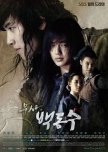
Epic and action are by a humorous ribbon tied together in a touching, gripping way. Go for it!
Set in a jaunty kaleidoscope of relationships, friendships, brothers in arms, blood ties, loyalty, heroism and heartbreak, the time of King Yeongjo, Crown Prince Sado and King Jeongjo is epicly (for a 2011 series production) portrayed."Warrior Baek Dong Soo" is full of fun, martial arts and of course: drama. There is politics, too, yes, butteh KDrama is definitely more on the drama and action side. I benevolently ignored some daring storytelling details and the selectively very optimistic choreographic freedom in the heroic staging. "Warrior Baek Dong Soo" balances between history and entertainment, between epic scope and personal tragedy, between deep, dramatic emotionality and airy, playful, humorous, good mood. The KDrama finds a rousing swell, in which the emotional waves are allowed to splash from all directions - with a story that sails between historically memorable facts, legendary heroes, steep (but by no means absurd) hypotheses, and colorful dramaturgical freedom. It offers great entertainment thanks to an exceptionally strong presence of all actors - whether young or old.
Baek Dong-soo himself is wonderfully portrayed by Yoo Jin-goo (young) and Ji Chang-wook (adult) in the sense of a largely impulsive jester who wears his heart on his sleeve. On the other hand, there is the introverted, somehow tragic, always serious and withdrawn Yeo Woon (Yoo Seung-ho as an adult and Park Gun-woo as a boy). The demanding life of the young warriors is sweetened by the unique charms of Hwang Jin-joo (cheeky, tomboyish: Yoon So-yi) and Yoo Ji-sun (stoic, reserved: Shin Hyun-bin). The by now veteran acting legend Choi Min-su as assassin lord in gothic style gives his very personal flavor throughout the 29-episodes long ride through time. And quite a few more there are.
In this KDrama it is rather the dramatic love story and love triangle of the older generation that pushes itself emotionally to the fore than that of the younger generation. This is probably due to the fact that Baek Dong-soo's generation is more dominated by humor and a cheeky mouth that wants to take on fate, while the older generation is dominated by the decades-long heavy burden of overwhelming life experience.
The historical hook of "Warrior Baek Dong Soo" is (as the title suggests) Baek Dong-soo, who went down in history as a heroic swordsman legend. He was one of three authors of the 'Muye Dobo Tongji' (= Illustrated Manual of Martial Arts), which is now officially classified World Heritage. This four-volume work summarizes the common weapon techniques of the Joseon period. (The book gained its extraordinary importance as a rare, valuable historical source on military affairs and Joseon martial arts, since older works fell victim to the destructive Qing invasions from the north.) However, swordsman Back Dong-soo first of all became legendary because he repeatedly saved King Jeongjo from being assassinated. And this juxtaposition of swordsmen serving the king versus assassins serving a however motivated client, originally inspired the 2010 KDrama comic entitled Honorable Back-Dong-soo.
The KDrama "Warrior Baek Dong Soo" thus also contrasts swordsmen and assassins - in terms of their ethics, their loyalty, their code, their mission, their training, their emotional world. This ambivalent and tragic dynamic makes the 29 episodes going and the time spent watching it worthwhile. They are so similar and yet they are worlds apart. One has to protect, the other has to kill. And yet, he who kills also protects. And yet, he who protects also kills. Both are henchmen. Both give everything. Risk everything. They're simply on different sides. Depending on the situation, the act of the swordsman is considered correct and honorable, while that of the assassin is considered a crime and vile. In my opinion, the KDrama reveals one of its strongest moments in the emotional explosiveness of the fatal bond between the first swordsman and the leading assassin lord (each of their own generation). They are so close emotionally and yet they live in different worlds: One in the light open, the other in secret. In tried and tested KDrama manner, the 'bad guys' (assassins) once again - despite the concentrated ambivalence of their characters - play their way taciturnly, but effectively into the hearts of the audience.
The framework for the plot is in beautiful continuity provided by sword fights and political intrigues. The flesh is made of fatal, ambivalent, intense relationship ties and feuds between the protagonists. History sets the direction. Epic and action are by a humorous ribbon tied together in a touching, gripping way. Go for it!
---------------------------------------------------------
Historical SIDE NOTE: --- Yangban of Joseon in the 18th century between conservative thinking and reformist, modern impulses. ---
The historical background of KDrama is shaped by three memorable decendants of the Joseon Dynasty. King Yeongjo, who holds the record-breaking 52-year reign on the throne, Crown Prince Sado, who went down in history as a tragic, possibly greatly misunderstood figure, and his son, who contributed to peace and prosperity as King Jeongjo. In addition to the serious efforts of the two kings for stability and progress, there are the divided camps among the nobles who fight by all means for their supremacy in political and social affairs.
Between 1674 and 1689 the Namin (Easterners) steered the administration of the country in their interests, followed by the Seoin (Westerners), who then entangled their position of power in disputes: the Noron representing the old, strict, conservative neo-Confucian doctrine and the Soron fighting for a new, modern, reformist, practice-oriented doctrine (Sirhak). It was probably King Yeongju's merit that despite the massive differences, the balance of power between the camps was well balanced for a long time. However, the price he had to pay for reasonably stable living conditions in the empire was his son, Crown Prince Sado, who favoured modern teaching and thus provoked the Noron. At least that is how one historical theory interprets the dramatic events surrounding Sado, who is said to have died locked in a box. The KDrama follows this theory (and not the annals, that present Sado as falling into insanity that could no longer be curbed, or a third theory that suspects a massive father-son conflict as the cause).
So, in line with the theory, which sees Sado as a progressive, reformist spirit, who wants to liberate his country from the supremacy of the Qing, "Warrior Baek Dong Soo" tells the story of the loyal followers of the ruling family, who are skilled in martial arts, and how King Jeongjo wants to live up to his father's modern visions. In doing so, with an open attitude the young king, too, always chose a balance and thus continued the proven political strategy of his grandfather, who in doing was able to stay alive more than half a century. In this way, King Jeongjo succeeded in the 24 years of his reign between 1776 and 1800 in building the Hwaseong Fortress as the center of his reign, in advancing education and science, in optimizing national defense and in creating the Royal National Library of Gyujanggak. However, he could never be sure of his life... at least seven assassination attempts alone during his first year in power are historically recorded. ... A striking reflection of the massive resistance against the attempted modernization of thinking in Yangban circles.
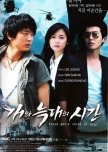
A spy drama right from the start
"Time between Dog and Wolf" is a KDrama from 2007. But don't worry, the series still knows how to grip today. (I don´t even dare to imagine what a terrific spectacle the KDrama would be, if it would come along in the style of 2020 KDrama cinematography...)The story starts - as so often back then - with the childhood days, e.g. the small and big traumata from that time. The entanglements are laid out and there's a lot in it Makjang-wise. However, it is not your typical makjang, The story is exciting, has a good pace and the shadowed complexity makes it difficult to see through. "Time between Dog and Wolf" is a spy drama right from the start and leaves hardly anything out.
The title sums it up quite well. Actually, this refers to the Latin metaphor "Inter Canem et Lupum" - between dog and wolf. In the evening twilight it is difficult to distinguish, so to speak, whether a wolf or a dog is standing in front of you, although you can just about make out that it will be one or the other. It's not pitch black yet.
However, this expression does not only refer to the twilight, but also contains another metaphorical allusion: This is the time when the wolf goes hunting and the dog seeks its bed... Who stands before me, though? Can I trust?
Thus the 16 episodes consistently maintain their twilight... Wolves (mainly) and dogs (a few) cross paths. Sniff each other. Fight each other. Join together to form a pack. Are hunted and hunt. Give themselves away. Make up for it. The one. The other. And others again. On top of all that, love puts plenty of salt into the wounds.
Ultimately, the symbol is even suitable for this KDrama in a third respect. In addition to the topics 'distrust/deceit', 'hunter/hunted', there is also the fact that both dogs and wolves are extremely social pack animals...
This is a KDrama that has a lot to offer in terms of exciting and moving entertainment. Lee Joon-gi shows edge here even at his younger age. But all of them express their emotions with some intensity. This does not go bye unnoticed.
The fact that a considerable part of the action takes place in Thailand also brings unexpected exoticism into the scene, which doesn't hurt.
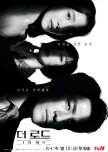
It´s opaque and rather gloomy, venturing to juggle shadow rather than light
"The Road: The Tragedy of One" is based on a (Japanese) novella by Rintaro Norizuki with its spotlight on the higher end of high society. The KDrama "Mine" from the same production year, which is located in a comparable segment at the top of the social pyramid, chose rich bright colors and extravagantly shimmering robes amidst glitz and glamor as the backdrop for a study on decadence and greed. In contrast, the TV production "The Road: The Tragedy of One" makes no attempt whatsoever to immerse human abysses in a colorful light that is somehow aimable and pleasently digestibility. No. This KDrama has a rather gloomy side to it. It´s opaque. Outrageous.You may vainly search for anything virtuous here. Let alone family values, especially when it comes to raising children. People mysteriously die. There is crime. Corruption. Affairs. Cowardice. Selfishness. There is (almost) nothing left of high moral standards. The series is heavy opera. Yet, excellently casted throughout. Everyone is doing their best. Still, whatsoever, it's not nice to look at. If the human ugliness is shown all too ruthlessly... who should one identify with? You have to delve far into your own abysses to sympathize and feel with the protagonists... (maybe one of the reasons, why the viewer ratings aren´t quite balanced to the true quality of the show...)
In any case, the KDrama is thrilling in its own pace and style. There are plenty of secrets throughout. You get Makjang, too ... obviously it can always get worse... (KDrama somehow always is great at drama!) It's opaque up to the end. The story takes its time to unravel the tangled threads. The screenplay is particularly atmospheric. Eventually, more of a trip into darkness. Literally (i.e. optically), too. I would call it an experiment in the latest KDrama Orbit, that dares to juggle shadow rather than light and ventures to tell a story without wholesome, easily digestible sweets.
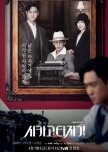
Touching. Exciting. Stylish. Passionate. Atmospherically dense, especially regarding the 1930s
For me, "Chicago Typewriter" needed a second attempt. The first time I didn't really know what to do with it. ...A smart spring chicken, but somehow paranoid writer, spoiled by success and money, and a cute girl as his fan? The story - fancy as it may come along - at first glance appeared a bit all too playfully shallow for my taste. I wasn't convinced. Although I actually really like actor Yoo Ah-in.Actually, I was mainly curious about the past (around 1930 when ´Korea´ was a colony of Japan). One of "Chicago Typewriter"'s two storylines is set in the context of the 1930's Gwangju student movement. With regard to the KDrama´s historical plot line though, it felt like nothing really happened for a long time. Accordingly, when I first had tried to watch "Chicago Typewriter", I didn't make it past the "beginning". However, somehow I kept stumbling across this KDrama and it wouldn't let go off me. Eventually I gave it another try. Lo and behold, with a little patience, the KDrama took me by the hand and developed an exciting story with a lot of passion and atmospheric density, especially when it came to the 1930s. The insight into that time had lasting impressions. Still, the relationship dynamics between the leads especially in the present time story line sometimes were little too light-weight, harmless and on the verge of silliness for my taste. However this was perfectly balanced in the context of their mission in the past and got more profound as the story proceeded.
------------------------- SIDE NOTE: --- Japanese colonialism ---
During the 1930s Japanese imperialism had reached its peak. In relation to Korea, a rigorous policy of assimilation, using force if necessary, was pursued, e.g. the Korean language, culture and history were systematically suppressed as part of a Japanese colonial education. The first Gwangju student movement, which culminated in a nationwide anti-Japan demonstration, happend in November 1929 after a female Korean student having been molested by Japanese students. This attack was certainly not the first, but the Korean student movement had formed in such a way that a large-scale street demonstration in Gwangju spontaneously took place after this incident. The mood swept across the whole country...
-------------------------
As a premise, the KDrama plays with the concepts of reincarnation and the concept of spirits remaining in near-earth realms after their death, until their unresolved past experiences are somehow redeemed. Both are popular motifs that are often picked up in KDramas. In this case, the producers have created a particularly beautiful and profound story, especially with regard to redemption. In 2017, the characters get a second chance, so to speak: they have the choice of whether they want to continue in their familiar pattern or make new decisions. There´s an opportunity to reconcile past guilt or open questions, to let go of the energy that still hangs in the past and to move on in the NOW. This aspect of time jumps is unabashedly and creatively juggled with an undeniable love for details. One of the protagonists, whose spirit since 1930 hasn´t been able to leave the earthly realms, becomes the connecting and driving force that knots both timelines. A special charm: The ghost from back then becomes a "ghostwriter" in 2017 when he meets his reincarnated comrades-in-arms. Another punchline: the title "Chicago Typewriter" is ambiguous, referring both to the typewriter as a "weapon" (with typed words) of the student underground movement, and to the Thompson machine gun - a rapid-fire weapon that was fashionable at the time, its nickname being areference to its characteristic rattling sound when launched.
As the story progresses, the rhythm of the present day being intertwined with the past - in the form of sudden memories or dreams - accelerates. The faster the time jumps, the higher the tension rises. It's actually going to be really dramatic, both in the past AND present...
In sum: the KDrama is giving you a clear idea of living under Japanese colonialism and of the resistance movement that rebelled against it. "Chicago Typewriter" is also a feast for the eyes in terms of fashion and equipment - both 2017 and 1930! "Chicago Typewriter" is first and foremost a moving story about friendship. And not to forget: a touching love story ...
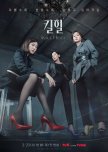
Lee Hye-young and her role operate as backbone and heartbeat of this KDrama
"Kill Heel" is set in the milieu of teleshopping. The pace is leisurely, calm. The light is dimmed sort of. The focus is on 3 women. Their heels are dizzyingly high.At first, the story leaves the audience feeling a bit lost. Just one thing is obvious: the competition in the production company is extremely tough. But over time, the three protagonists get more profile and the story heads in it´s direction.
The driving force that really makes the KDrama worth seeing is, above all, veteran Lee Hye-young, who has experienced a real revival in recent years. Here, in the ambivalent character of Gi Mo-ran, she gave another marvellous performance! In my eyes she (and her role) operate as backbone and heartbeat of this KDrama
It's about intrigues, struggle for survival, hurt feelings and old traumas. The relationship dynamics between the 3 women intelligently intertwine and dissolve in a subtle but unexpected way.
"Kill Heel" has a very unique look and feel to it and comes along with a peculiar pull effect. There is suspense, but at the same time the suspense isn't setting the tone. Sometimes something seemingly builds up, but then everything is completely different again. And after 14 episodes it's over. What a pity, actually...
------ SIDE NOTE: ---Teleshopping---
I wasn't really aware of the impact of teleshopping until now. In Europe within homeshopping Germany is the leader, when it comes to sales figures through teleshopping (compared to online-shopping) . In South Korea, teleshopping accounts for almost 50 percent of home shopping. Similar to sales parties in private circles (Tupper & co.), teleshopping thrives on impulse purchases and customer loyalty, which are promoted by a harmonious, interactive, relaxed sense of community. Within the virtual television community, it is the presenters who foster this intimacy with their virtual customers. Women in particular buy in teleshops.
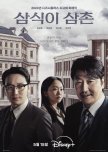
Great performance & complex narrative re. challenges in politics during dreary SK post-war decades
"Uncle Samsik" offers a quite interesting narrative of the complex connections between party politics and the even more crucial backroom politics during South Korea's first republic (1948-1960). The KDrama is primarily set in the run-up to the turbulent events and nationwide demonstrations that led to the resignation of the first President Rhee and the founding of the second republic. However, the nation that had hoped for real democracy and prosperity stumbled into a third one just three years later through a military coup. Although this brought the hoped for prosperity via totalitarian capitalism, it was still far from real democracy...The story of the KDrama is based on historical events, themes and people of that time, but is ultimately fictional - even if historical film sequences are occasionally interspersed as part of the April Revolution. The focus is on Uncle Samsik. For all those, who don't know much about South Korean history, Uncle Samsik is the emotional reference figure and dramaturgical bridge that holds all the politically complex threads together. Even without prior knowledge, "Uncle Samsik" offers an exciting, haunting political drama that takes place in the post-war years. It is in particular thanks to the passion of the great actors who manage to captivate the audience with comparatively 'dry' fare. It is advisable to watch the episodes consecutively so as not to lose the thread.
With a fictional plot the well-known historic events and what actually drove the political actors of that time are portrayed from different perspectives. Thus they are shown as multifaceted people with complex motives and stories. Political calculation becomes tangible through relationship dynamics and formative personal experiences. What created the conditions for that dictatorial regime and its totalitarian capitalism to torpedo South Korea into dazzling prosperity - the needs, hopes, ideals and concerns underlying the political actors - are being filled with life. And at the same time also what the young democracy still has to gnaw at today - authoritarian directive, opaquely networked and strictly hierarchically structured backroom politics.
The time in which the KDrama is set is marking the initial struggle to set the course for 'right' politics and a democratic political culture to start with. You have to keep in mind that Korea has not yet been able to gain much experience with modern, international politics and economic policy on the world market. Until the end of the 19th century, the Joseon Kingdom had isolated itself from the rest of the world and concentrated on itself. Western modernity and international influences increased during the early 20th century, especially while the Korean peninsula was a colony of Japan. The guidelines for political autonomy and independent parliamentary politics were only set in the course of the founding of the Republic of Korea as South Korea in 1948. And even then, the USA kept a close eye on the young republic. The people in South Korea had not yet been able to seriously experience themselves as political mature people of a democratic country... The south, by now isolated from its rich in raw material and industrially well developed north, was at that time one of the poorest agricultural countries in the world.
Uncle Samsik vividly depicts the conflicting feelings in the country. He represents the prevailing longing for wealth... or simply for three meals a day. Uncle Samsik's nickname already reflects what he stands for: sam (eum)sik = three meals. He (as a good uncle) grants this to his people. So actually this very basic human need was the top priority in those politically turbulent years. Hunger and poverty shaped everyday life for the many. Democracy as a political ideal may sound good, but it doesn't fill your stomach. Samsik cares about people. His political goal is to use all possible means to support those politicians who have a solid concept and can bring the country to a point where the people will soon have enough to eat. The way to get there: to consistently boost the economic power of the economically weak country (compared to the north) and thus create appropriately paid work whose salary is enough to provide for the families... even if that might imply that the people´s hope for true democracy still has to wait a bit longer...
So would I recommend "Uncle Samsik"?
Yes, but...
It's one of those things with historical dramas that deal with Korea´s recent post-war history (and with the KMovies about the first post-war decades, too... you have to want to see it. Colours, light, selection of protagonists - this is often enough inevitably not a treat. Colorful robes that were still common in Joseon times are rarely seen anymore. After the Japanese colonial period and at least since the influence of the USA in the wake of the Korean War, fashion has been completely westernized. This makes the production design comparatively rather dreary - dark suits, ties and plenty of scenes inside or in the dark. It is about scenes inside offices, hotel bars, conference rooms and bunkers instead of lushly planted palace gardens, picturesque bridges, colorful pavilions and pagodas, or the shaded, meditative palace walkways - it's all history. Politics by now happens behind closed doors. If suitable, it might sooner or later end up on the streets, too. Female characters with impact are also rare - gone are the lively days of palace ladies, servants and princesses, scheming dowagers and queens or spying gisaeng... Instead, there are lots of serious men in their (as I mentioned before) dark suits, preferably smoking and debating or giving orders in back rooms. Politics is a man's business - a power struggle that is eventually resolved with the help of thugs and cloak-and-dagger operations... (After all, women's power is at least trying to carve out some space in "Uncle Samsik"...)
In short, the setting is rather dark, complex, even complicated - and ties-heavy. Be aware.
Apart from that, "Uncle Samsik" is really well done. Vividly played and thematically differentiated, the KDrama brings those dreary, sobering post-war decades in South Korea to the international DisneyPlus audience, presenting it as a time that, despite all the prevailing corruption, arbitrariness and obedience to authority, was also characterized by a lot of idealistic passion and political hope. Once again, high-end historical drama à la KDrama...


 9
9 40
40 15
15

















